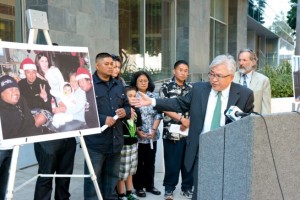Suit filed vs. Long Beach in cop’s killing of bipolar Fil-Am

Lawyer Joe Sayas explains civil rights case against the City of Long Beach as Mharloun Saycon’s family looks on. AJPRESS
LOS ANGELES – The City of Long Beach, California faces a federal civil rights lawsuit filed on behalf of the family of Mharloun Saycon alleging that his death at the hands of police last December was an unjustified murder.
The suit announced on Thursday, July 29 accuses the city and two of its officials of failing to train the Long Beach Police Department (LBPD) to properly approach situations involving people suffering from mental illness.
Attorneys Joe Sayas, Dan Stormer and Caitlan McLoon say the patrol officer Vuong Nguyen, who shot Saycon, made no attempt to peacefully interact with the Filipino American before shooting him eight times inside Looff’s Lite-A-Line arcade on December 4 of last year.
Police statement
Representatives of the LBPD issued a statement saying Saycon, who had been diagnosed with bipolar disorder, was waving around a knife and frightening customers before officers arrived.
“The suspect failed to comply with any of the officers’ orders. Officers then deployed less lethal options, which included an electronic control device and baton,” according to the statement.
LBPD officials say the officer opened fire only after non-lethal measures failed to subdue Saycon. However, the family’s legal team said Saycon hadn’t even risen from his chair before officers attacked him.
On Thursday, the Saycons’ attorneys said they have collected video evidence and witness statements corroborating their understanding of the events.
“They made no effort to engage with Mharloun, who was seated, [and] was calm,” said McLoon, who added that less than two minutes transpired between the officers’ arrival and Saycon’s death. “The pocket knife was closed in his lap and they could visibly see that when they entered.”
Request for documents
Meanwhile, the family’s lawyers say the LBPD has not complied with their requests for documents and materials relevant to Saycon’s case. Sayas told the Asian Journal the department also declined to file official comments in court responding to the suit’s allegations.
“We are willing to listen,” said Sayas. “If they have contrasting or contradictory evidence we would like to see it.”
Saycon’s relatives are particularly interested in hearing the 911 call from that evening, which Stormer said would have been released by now under normal circumstances. Saycon’s brother, Mike, said he has become suspicious of the LBPD’s secrecy and wonders if the department is attempting a cover-up.
“I want to hear it … If you have nothing to hide, give it up,” said Mike Saycon, who described his sibling as well-liked by Looff’s regulars during Thursday’s press conference. “He wasn’t a violent person aside from his disability. When it was controlled and he was on his medication he was just like any of us.”
Larger pattern
The Saycons’ lawyers allege that his death is part of a larger pattern of excessive force exhibited by police.
“The City of Long Beach has, in our opinion, engaged in a practice of allowing rogue cops to kill people,” said Stormer during a press conference announcing the suit’s filing.
“I know that sounds like an incredibly harsh statement, but the events of last year have shown repeated killings of individuals who have some level of mental illness.”
Lawyers for the plaintiffs said Looff’s owners were on good terms with Saycon and were aware of his condition. Stormer said they had called police hoping they would escort Saycon to somewhere he could get treatment.
Instead, officers allegedly entered Looff’s with guns drawn and, in rapid succession, tazed Saycon, beat him with a baton then shot him according to his family’s attorneys.
Mentally disabled fatalities
More than 25 percent of the 462 people shot and killed by police nationwide in the first half of 2015 were suffering from a state of mental or emotional crisis, according to the Washington Post.
Although most of the 124 cognitively impaired people killed were armed, the majority of officers who shot them were dispatched on requests similar to those made by Looff’s owners, termed “5150 calls,” rather than reports of a crime. More often than not, officers knew beforehand they were entering a situation involving a person with a mental illness.
“Mharloun needed medical care more than anything else,” says Sayas, who contends that Nguyen violated the American Disabilities Act by attacking and subsequently killing a person known to have a mental disability instead of helping him receive treatment. “Disability rights are civil rights. Disability rights are human rights.”
Sayas, Stormer, McLoon and the Saycon family hope the tragedy of Saycon’s death will result in policies and programs that will prevent instances of excessive force and improve interactions between police and mentally ill people.
They are also seeking punitive damages against the officers involved in the shooting and Police Chief Robert Luna, and calling for a thorough investigation into the conduct of officer Nguyen, who is still on active duty with LBPD.